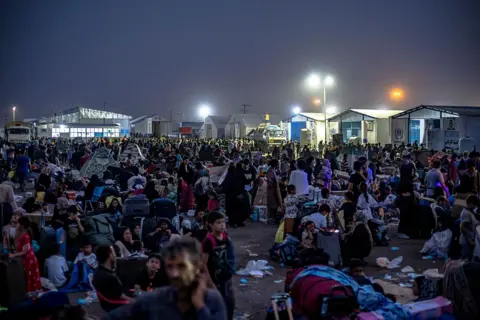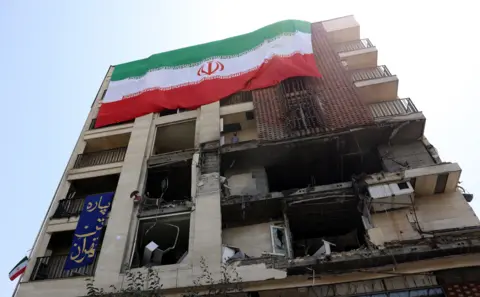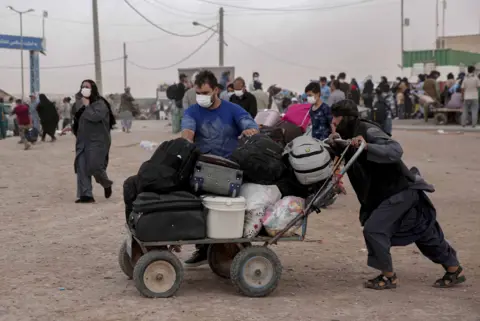BBC News Afghan & BBC Global Disinformation Unit

 BBC
BBC
Some Afghans in Iran have been accused of espionage in the wake of the 12-day conflict with Israel.
Ali Ahmad's eyes fill with tears as he lifts his shirt to show deep bruises across his back.
While he was detained, Iranian officers struck him and accused him of spying, he says. "They used hoses, water pipes and wooden boards to beat me. They treated us like animals."
He was speaking to the BBC earlier this month at Islam Qala on the two countries' border, before crossing back over to Afghanistan. His name has been changed to protect his identity.
Iran - which says it hosts more than four million undocumented Afghans who fled conflict in their homeland - has been stepping up deportations for months. In March those without papers were given a July deadline to depart voluntarily, but since a brief war with Israel in June, the authorities have forcibly returned hundreds of thousands of Afghans, alleging national security concerns.
Daily returns peaked at about 50,000 people in early July, according to the United Nations – often after arduous journeys.
Ali Ahmad says Iranian officials confiscated his money and phone and left him without "a single penny to travel back". He'd lived in Iran for two and a half years.
'Scapegoats'
Iran's crackdown has coincided with widespread accusations linking Afghans to Israel's intelligence agency Mossad, including Iranian media reports that cite police sources claiming some individuals were arrested for espionage.
"We're afraid to go anywhere, constantly worried that we might be labelled as spies," one person, who wished to remain anonymous, told BBC News Afghan.
"You Afghans are spies", "You work for Israel" or "You build drones in your homes", are other frequent accusations, according to this individual.
Barnett Rubin, an expert on Afghanistan who served as senior adviser to the US Department of State, says Tehran may be "looking for scapegoats" for its shortcomings in the war against Israel.
"The Iranian government is very embarrassed by their security failures", which show Iran "was very thoroughly penetrated by Israeli intelligence", he says.
"So they had to find someone to blame."
Critics also say the accusations of espionage are aimed at buying legitimacy for the government's plan to deport undocumented Afghans.
The BBC attempted to contact the Iranian government but did not receive a response. The return of Afghan refugees "without tension and with respect for human rights… is a goal pursued at all levels", the state-backed Islamic Republic News Agency said on 18 July.
'Four days, like four years'
Abdullah Rezaee, whose name has also been changed, has a similar story to Ali Ahmad.
At the detention centre where he was held, about 15 Iranian officers physically harmed him and other deportees, Abdullah told the BBC at Islam Qala.
"Iranian police tore up my visa and passport and beat me severely. They accused me of being a spy."

 Getty Images
Getty Images
It is estimated that there are over 4 million undocumented Afghans living in Iran.
Abdullah says he'd only been in Iran two months before being detained, despite having a visa.
"They beat us with plastic batons and said: 'You're a spy, you're ruining our country'."
The four days he was detained "felt like four years". He describes constant mistreatment, physical abuse and lack of food.
The online allegations of collaboration between Afghans and Israeli secret services started early in the war.
On 13 June, the day Israel attacked Iranian nuclear and military facilities, the government issued statements to the population, asking citizens to report suspicious activities such as unusual movements of vans, which might be transporting Israeli operatives' weapons.
Then Telegram channels with large followings posted warning messages using similar wording to the government's. But they added that the population should be vigilant of "alien citizens" – an expression mostly used to describe Afghans in Iran – driving vans in big cities.
The following day, a series of detentions of people allegedly connected to the Israeli attacks, including some Afghans, were reported.
On 16 June, news channels broadcast a video of Afghans being detained claiming that they had been carrying drones with them. It went viral. But the video was old, and portrayed migrants detained due to their undocumented status.
On 18 June, a Telegram group attributed to the Islamic Revolutionary Guard Corps posted that 18 Afghans had been arrested in the city of Mashhad for building drones for Israel, according to the independent monitoring group Afghan Witness.
The following day, the provincial deputy security chief was quoted saying the arrest had "no connection to drone-making" or co-operation with Israel. "They were arrested solely for being in Iran illegally."
But posts connecting the arrests to espionage had spread widely on social media platforms. A hashtag saying the "expulsion of Afghans is a national demand" was shared more than 200,000 times on X in the space of a month, peaking at more than 20,000 mentions on 2 July.
Anti-Afghan sentiment on Iranian social media is not new, but the difference this time is "the misinformation is not just coming from social media users but from Iranian-affiliated media", according to an independent researcher at Afghan Witness.

 ABEDIN TAHERKENAREH/EPA/Shutterstock
ABEDIN TAHERKENAREH/EPA/Shutterstock
The conflict started when Israel attacked nuclear and military sites in Iran, and then Iran retaliated with aerial attacks targeting Israel.
From 'serial killers' to 'spies'
More than 1.5 million Afghans have left Iran since January, according to the UN Refugee Agency. A spokesperson from the Taliban's Ministry of Refugees and Repatriation told the BBC that more than 918,000 Afghans entered Afghanistan from Iran between 22 June - 22 July.
Some had been in Iran for generations.
Millions of Afghans have fled to Iran and Pakistan since the 1970s, with major waves during the Soviet invasion of Afghanistan in 1979 and more recently in 2021, when the Taliban returned to power.
Experts warn Afghanistan lacks the capacity to absorb the growing number of nationals forcibly returned to a country under Taliban rule. The country is already struggling with a large influx of returnees from Pakistan, which is also forcing hundreds of thousands of Afghans to leave.
At first, Afghans were welcomed in Iran, says Dr Khadija Abbasi, who specialises in forced displacement at the School of Oriental and African Studies (SOAS) in London. But anti-Afghan sentiment increased gradually, with state media portraying Afghan refugees as an "economic burden" to society, she says.
False narratives about Afghan migrants in Iran followed suit.

 SAMIULLAH POPAL/EPA/Shutterstock
SAMIULLAH POPAL/EPA/Shutterstock
Afghanistan is grappling with a humanitarian crisis as Iran intensifies the deportation of Afghans
In the 1990s, a series of rapes and murders in Tehran was widely assumed, without evidence, to be the work of an Afghan, which led to a rise in hate crimes. It was later revealed that the killer was Iranian.
When an estimated two million Afghans migrated to Iran in the post-2021 wave, exaggerated posts on social media claimed more than 10 million Afghans were living in the country. Iran had been the only neighbour to allow refugees and migrants to enter at scale during that time.
Expulsion of Afghans from Iran, says Dr Abbasi, "might be one of the very rare topics that most Iranians" are in agreement with the government – although in July more than 1,300 Iranian and Afghan activists signed an open letter calling for an end to "inhumane" treatment of Afghan citizens in Iran.
Today, anti-Afghan sentiment is widespread. "It has become very dangerous," she says, "so people will just try to stay at home."
For huge numbers that is no longer an option. The border continues to swell with people.
For Abdullah the deportation has destroyed his plans.
"I lost everything," he says.
By Babrak Ehsas, Yasin Rasouli, Rowan Ings, and Sucheera Maguire, with additional reporting by Soroush Pakzad

 23 hours ago
4
23 hours ago
4








![35-year-old American moved to Chengdu and lives on $30,000 a year: '[It's] poverty in America, but in China I'm living large'](https://image.cnbcfm.com/api/v1/image/108167583-1751548516689-chinacelia1.jpg?v=1751549197&w=1920&h=1080)

 English (US) ·
English (US) ·